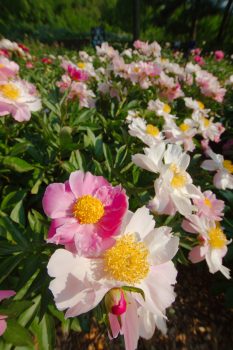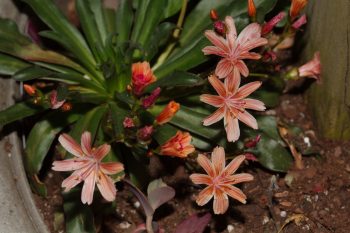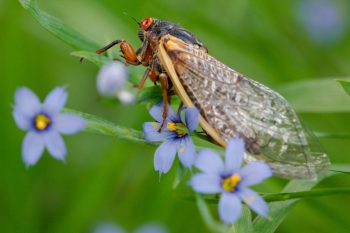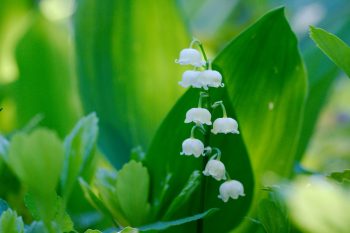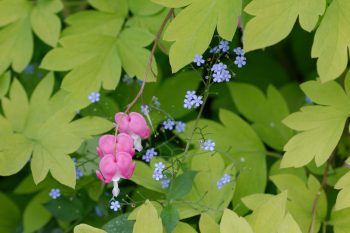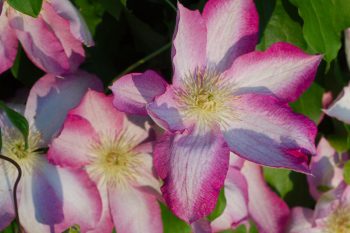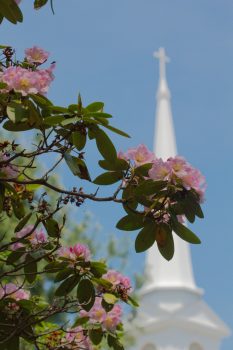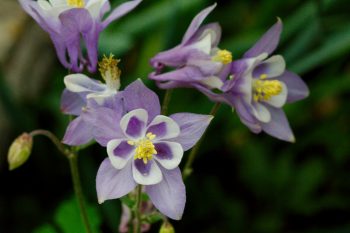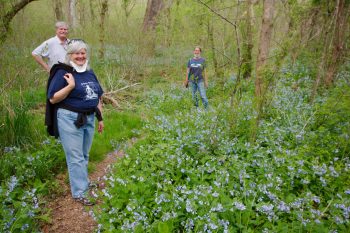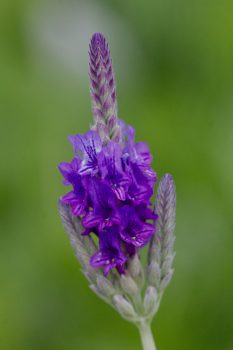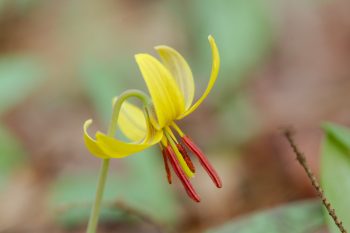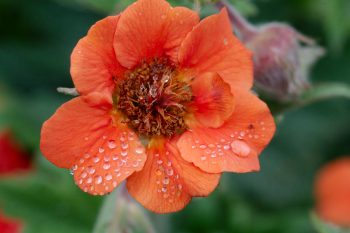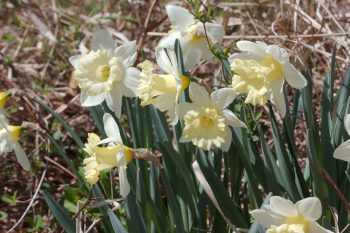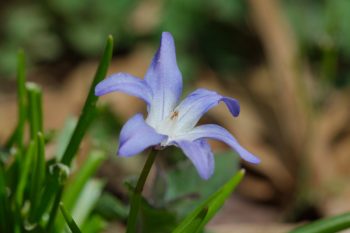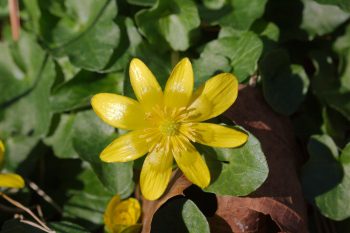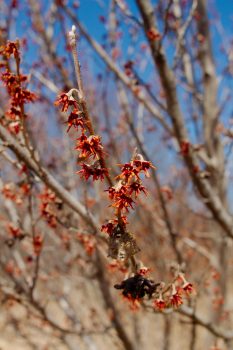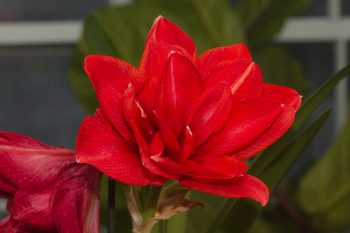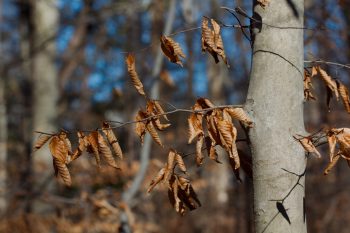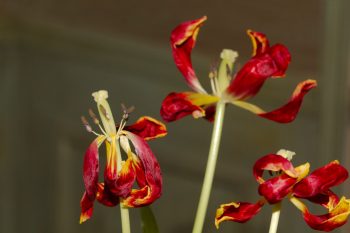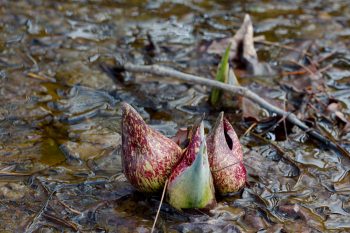Cathy and I decided to go to the Schwartz Peony Garden in Seneca Creek State Park. We met Dorothy there and had a great time enjoying the flowers. There were only a few folks there when we arrived, although two of them were a camera crew from a local TV affiliate. The ‘formal’ garden—which isn’t terribly formal, but comparatively speaking—is really something and of course we spent a good while there. But we also really enjoy the informal field that’s got many, many more peonies growing throughout it. You’ll probably want to wear long trousers, socks, and shoes if you are going to wander there, especially if you plan to get off the paths at all. There’s a bit of poison ivy to watch out for. But it’s worth it. The flowers are amazing. We all agree that the darker colored flowers are generally our favorites, regardless of if they are single, with only a few petals or very double. But we also like some of the others. They’re all nice, actually.
Flowers and Plants
Schwartz Peony Garden
Lewisia cotyledon
Cathy and I went for a short walk in the neighborhood this evening. It was getting dark but I carried my camera with me anyway. I had the flash, so I was able to take a few photos. None of them are what I’d describe as great pictures, but this is a little interesting. It is (I’m pretty sure) Lewisia cotyledon, also known as Siskiyou lewisia or cliff maids. It’s an alpine plant native to northern California and southern Oregon and it’s growing in a container near our neighbor’s mail box.
Cicada on Blue-eyed Grass
The cicadas (Magicicada species) of Brood X are beginning to emerge from their 17-year subterranean sojourn. Interestingly, this one, near the base of a large oak tree, is one of only a few at this site. Another oak tree at the other end of the yard is absolutely covered with them. I suspect I’ll have a few more photos before their visit comes to an end but I thought for at least one photo I’d include some flowers to brighten what is otherwise a sort of ugly bug. Blue-eyed grass (Sisyrinchium angustifolium) is something of a weed around our yard, but it’s at least a pretty weed.
Lily of the Valley (Convallaria majalis)
The lily of the valley (Convallaria majalis) is in full bloom right now. We have a large patch of it in the back yard and then smaller patches in a few other places. This is growing near the front corner of our house and it’s very happy. One thing about lily of the valley, at least for us, is that it seems to want to move. That is, the clump or colony spreads and the tail edge dies back, so the whole colony migrates over time. I’m not sure what, if anything, can be done about that.
Bleeding Heart and Siberian Bugloss
After going to Fehr’s Nursery in Burtonsville, we stopped for lunch as a Cuban place on the way home. We could have picked a better day for it, as it was jammed for Mothers Day and it took us over an hour to get sandwiches. We’ll probably give them another try on a less busy day, but it was a bit off-putting. We drove to Woodlawn Manor and ate our sandwiches in the shade of one of their lovely trees. Then we walked around and I took a few photos, including a couple of the bleeding heart (Lamprocapnos spectabilis) and Siberian bugloss (Brunnera macrophylla, similar to forget-me-not) growing together under an America holly (Ilex opaca). Quite pretty, don’t you think?
Clematis
We took a walk in the neighborhood this evening and I took this photo of a clematis growing on a mailbox a few blocks over. Whether you pronounce it KLE-ma-tas or kle-MA-tas, it’s a pretty thing. We have a few of them but none are doing exceptionally well. One doesn’t get enough sun (it was there when we bought the house and we talk about moving it but so far it hasn’t happened). Another was overshadowed by a rose bush. The rose is gone now but the clematis needs a bit more support than it has.
Shady Grove Steeple
We started going to church in person today. We went twice last year, when the services were outdoors and with the weather being so nice, we started again today. We plan on making it a regular thing. Although we’ve become a bit accustomed to our stay-at-home Sunday routine, we felt we needed to get out with people a bit more. It was a lovely day and there were a pair of hawks circling the church for a while. I had my camera with me and after the service, I took a few pictures, mostly of the rhododendrons blooming in the woods to the south of the church. With the flowers in the shade and the steeple in the sun, it was a little tricky to get this picture, but I think it turned out pretty well. On the way home from church we stopped at Lake Needwood and I took more pictures of our native Piedmont or mountain azaleas (Rhododendron canescens) in the woods there.
Columbine
This columbine (Aquilegia) is growing in a container just outside our front door. It’s a almost certainly a hybrid of some sort but I really don’t know anything about its parentage. It’s a pretty, pale purple color that looks especially nice in the shade. The purple goes very well with the bright yellow centers. Any time you can combine purple and yellow, it’s a winner. These are very hardy plants and grow in relatively poor conditions, which makes the ideal for a garden, especially in a shady spot.
Bluebells with Rob and Susie
We met up with our good friends, Rob and Susie today and went for about a three mile walk through the woods. We were heading towards where we knew there would be Virginia bluebells (Mertensia virginica) and it was a lovely walk. We came upon a patch of yellow trout lilies (Erythronium americanum) as seen on Saturday, May 15, 2021. We had to walk further than I expected to get to the bluebells and we could have parked closer, but the walk through the woods was really nice, so it wasn’t a waste.
Lavandula pinnata
We met our newlywed friends Josh and Lizzie today for lunch. It was, we think, the first time we’ve eaten in a restaurant since the Covid lock down started. We sat outside and though it was a little cool, it was really nice to be able to sit and visit with them. On the way home we stopped at Fehr’s Nursery, mostly just to look around rather than to buy anything this time. I like this little lavender (Lavandula pinnata, sometimes called fern leaf lavender). It’s apparently a native to southern Madeira and the Canary Islands and I’m not sure how hardy it is, but it’s a pretty thing.
The lavender we have in our front garden, Lavandula stoechas ‘Anouk Supreme’, is starting to come back to life. I think we probably should have trimmed it before it started to grow, so it may not have as many blooms on it this year as it did last. It put on quite a show last year and I’d like to figure out the proper care so we can get that more regularly.
Erythronium americanum (Yellow Trout-Lily)
In our second attempt to reach Bluebell Island, we walked south on the Seneca Bluffs Trail from the parking area on Montevideo Road. Looking at the map, this comes close to the creek just below the island. We found, unfortunately, that when you get to that point, you’re on the top of the eponymous bluffs. We could have worked our way down to the creek but decided it wasn’t worth the effort. We could see that on the far bank of the creek the bluebells (Mertensia virginica) were blooming in great profusion. We saw other wildflowers and the hike was a success, in spite of the fact that we didn’t get to our planned destination. This yellow trout-lily (Erythronium americanum) is one of our prettiest spring flowers, photographed under some large Canadian hemlocks (Tsuga canadensis).
Geum ‘Rustico Orange’
Geum ‘Rustico Orange’
Cathy, Dorothy, and I went to Stadler’s and Johnson’s this morning and the girls bought a bunch of things. I mostly took pictures although I did buy one Santolina chamaecyparissus (lavender cotton) to put in a container. We’ve not had great success with Santolina in the ground because we don’t have good drainage but I thought it might do well in a pot. I like this little perennial and thought I’d share the picture, even though we didn’t actually buy it. There is a small garden at the entrance to our neighborhood and there are a few of these growing in that. They really catch the eye.
Daffodils
Cathy, Dorothy, and I went up to Pennsylvania today to do a bit of work in the front yard. There is a small garden bed along the front of the cabin and it had become very overgrown. At the work day on March 13 we cut the small trees that were growing in it but today I dug up the roots of some of them. It was hard work and made a little harder because I wanted to avoid killing the peonies, irises, and lilies that were starting to come up among them. I didn’t take many pictures on this visit but I did take a few of the daffodils growing on the dam.
Chionodoxa forbesii
It’s been more than a couple years since I planted any new bulbs but of course, one of the beauties of bulbs is that they come up pretty reliably every year. Tulips aren’t that long lived, but daffodils and some of the smaller, more ephemeral blooms will likely be coming up long after I’m gone. This is one of my very favorite blooms, Chionodoxa forbesii, also known as glory of the snow. I like the fact that it blooms so early but I think my favorite thing about it is the amazing blue color. I really need to plant more of this.
Ficaria verna
Dorothy, Cathy, and I walked on the Seneca Greenway Trail this afternoon, parking where MD 28 crosses Seneca Creek and walking downstream. We only saw a few other people and it was a very pleasant walk. It’s relatively flat, with only a few ups and downs to deal with. The birds were out in force and we heard them all around, although we weren’t stopping to see them so much and didn’t really get very close to any. I did stop to take a few photos, including of this fig buttercup, also known as lesser celandine. It was formerly classified as Ranunculus ficaria but is now Ficaria verna. It’s an invasive, non-native species that grows in many of our wetlands.
Witchhazel (Hamamelis x intermedia)
Dorothy has planned a work day for Saturday at our property in Pennsylvania. The two of us went up today to look things over and to make sure we were ready for all the volunteers. It was a beautiful day, although cool. There was still a little snow on the ground in sheltered areas but that should be gone shortly.
The witchhazel (Hamamelis x intermedia) is in bloom, which I really like. There were also a few small irises coming up and getting ready to bloom and in the woods there were a few large patches of snow drops that were in full bloom. So, while most plants are still in winter mode, there are a few that get an early start on the year. But I particularly like witchhazel, with its somewhat unusual orange, red, or yellow flowers. I think it should be grown more than it is. A foretaste of spring.
Amaryllis
When I was helping Dorothy take pictures of the farm’s produce a week ago, Janis gave me this amaryllis to bring home for us to enjoy until it is finished blooming. It has huge, double flowers and it’s really amazing. This is the third bloom and it’s going strong. When it’s done, Janis asked that we bring it back so she can tend it for next year. What a treat. We grown them fairly regularly but don’t generally get a better flower the second year. This one has clearly been treated right.
Beech Leaves
Cathy, Dorothy, and I went for a walk in the local park this afternoon. In the winter I have to look a bit more for things to photograph but there’s generally something if you take the time. There was a time I didn’t care for the fact that some trees keep their dried leaves on until spring but I’ve come to enjoy beech trees, especially when the winter light is shining through them. That’s not the case here, but with the smooth bark of the tree and their nice texture, I still like them. It’s one of our best native trees and they’re very common in the woods. I large beech tree is an impressive sight.
Tulips
We’ve had a vase of tulips on our dining room table for a few days. Obviously they are a little past their prime, but I find them quite pretty even in this state. It’s more about color and form than about them as flowers qua flowers. I think I could have done a bit better to eliminate the background from this. Perhaps taking it with a black background would have been better. But, it’s what it’s, as we like to say.
Skunk Cabbage (Symplocarpus foetidus)
We walked on a section of Muddy Branch trail today that we hadn’t been on before. We went roughly 1.8 miles each way and enjoyed being outdoors. We saw a few belted kingfishers (Megaceryle alcyon) and there were lots of small songbirds in any thicket we passed. There were a few places with standing water and a few of them had a skunk cabbage plants (Symplocarpus foetidus) growing in them. It’s one a small number of thermogenic plants, which produce heat by chemical reaction and raise their temperature above that of the surrounding environment. Pretty cool.

